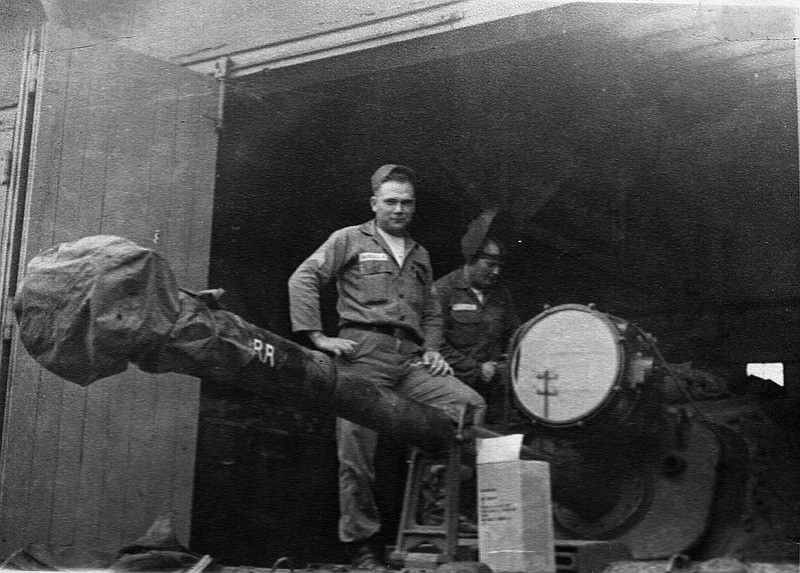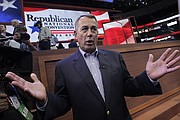HOOKS, Texas-Billy Bridges has served his country for 45 years-12 years active in the U.S. Army and 33 at Red River Army Depot, building and repairing equipment for the nation's military throughout the world.
But he hasn't done it alone. He's been married more than 60 years to his beloved wife, Ernestine Bridges. She's also done her part.
On Veterans Day, Billy wears his dog tags that includes his name and military number.
"I had dog tags made up for me and I wear it every Veterans Day just like he does," his wife said. "The families had to work and sacrifice just like their spouses who were fighting in the war. I say I served when he did."
Veterans Day has a special meaning to Bridges. "It means a lot of things to me. I saw this soldier on TV and he had lost both his legs and he said, 'I gave both legs for our country, and I want you to stand up for me.'
"And every time I hear 'Taps' played, it brings tears to my eyes for all the people who have sacrificed by giving their lives for our country."
Bridges spent a dozen years in the Army, serving from December 1957 to 1970. He was stationed at several bases, including some in Kentucky, Georgia and Texas. He also served just over a year in Vietnam.
"I got wounded twice in Vietnam and was awarded two Purple Hearts and two Bronze Stars," he said. "I was awarded five medals total and several ribbons."
One of his Bronze Stars was for valor when he pulled his commander "out of a bad situation," he said.
He served as a platoon sergeant in the mechanized infantry, which included tanks and carriers. "The platoon I was in, we had five vehicles and five-men crew in each. I did the job of a lieutenant since we didn't have one."
He also served as a paratrooper, jumping out of airplanes behind enemy lines.
He said he fought the North Vietnamese Army and the Viet Cong (rebels from South Vietnam).
"The Viet Cong were the locals who worked in the fields and farms during the daytime and dressed as soldiers and fought against us at night. They tried to kill us any way they could."
The enemy used long tunnels throughout the war, moving troops and supplies without the Allies seeing them.
"We had this one Indian man from Oklahoma who wasn't afraid of anything," Bridges said. "He would go in those tunnels when no one else wanted to. He just said 'Give me a good flashlight and a pistol and I'll go in.'"
Bridges' wife said she prayed every day that her husband and the other U.S. troops would return home safely. Back then, when a soldier was killed in combat, a telegraph would be delivered bearing the bad news to the family back home.
"I never went to answer the door when he was over there fighting," Ernestine Bridges said. "A lot of times I would hear a knock on my front door, but I wouldn't answer it. I would go and hide in my bedroom closet. I was too scared to answer it and get the potential horrible news that my husband possibly had been killed. I wouldn't even know who was at the door."
One was a relative who came by just to see how she was doing.
"I later ran into him in town and told him that I wasn't answering the door because I was afraid to," she said.
Bridges met a couple of famous people during his deployments overseas.
"I saw Bob Hope's show one time," he said. "They didn't have any stage or another like they do now, but it was just held on the side of a mountain. He put on a good show.
"I remember his opening act. He said, 'My name is Bob Hope and this man beside me is named No Hope.' He was a wonderful entertainer for the troops."
Bridges also saw and talked to Elvis Presley during his stint in the Army in Germany.
"I never did care for his (Elvis') music, but during his two years of active duty, he did just what he was told," Bridges said. "When I saw him, he was on field maneuvers and he was driving a Jeep for a colonel. They stopped where we were and we talked to him, but at that time I didn't even know who he was."
Bridges was the only member of his immediate family who joined the military. He had three sisters and two brothers.
He enlisted to avoid being drafted.
"Back then, I was at the right age and physical condition that I knew I was fixing to be drafted," he said. "Another guy told me if you're drafted they're going to put your where they want to. If you volunteer and enlist, you've got a little better choice where you go."
The Army was the only branch of the U.S. services that drafted soldiers.
"He loved the Army and he was made for the military," his wife confessed.
Would he join the Army and do it all over again?
"If I was back in my younger days, I probably would," Bridges said. "I would have fought in World War II, but I wasn't old enough."
Bridges is the last member of his immediate family still living.
"I had a brother who died Dec. 9, 1999, and nine days later, my mother passed away at age 90," he said.
All the others died of some form of cancer, his wife added.
Bridges has had his share of physical problems, including a bout with colon cancer.
"I wasn't over there when they sprayed Agent Orange, but I was there after they had sprayed it and it killed almost all of the vegetation and trees," Bridges said. "I think it has made thousands of our servicemen and women sick or killed them with some type of illness that resulted from it."
He devotes a lot of his attention to staying physically active and in good health.
"We both walk three miles every day," his wife said. "It does us both good."
Bridges, who resides with his wife near downtown Hooks, worked about 20 years with his close friend, Bill Thomas, building chain-link fences.
"Bill's just like family to me," Bridges said. "He's like a brother."
Bridges said he doesn't want to go back to visit any of the war sites, like Vietnam.
"A guy from Texarkana went back and said Cam Ranh Bay wasn't much but an unloading place during the war," he said. "Now it's got big skyscrapers, hotels and other big buildings. You wouldn't even recognize it."
Bridges admits he tries to keep his war duties in the past and doesn't really think about them. He doesn't even watch war movies.
"When I first came back home, a loud noise would make me draw up and make me nervous," he said. "But I've never really had Post Traumatic Stress Disorder (PTSD)."
When he got home from Cam Ranh Bay (South Vietnam), the troops weren't treated like heroes or defenders of freedom. The Vietnam War had divided the nation, with several protests going on every week.
"The reception at home wasn't very good," Bridges said. "I didn't even wear my uniform after I got civilian clothes. I just tried to forget it."
Bridges was buying car tags for two vehicles one time and the reception said, "That'll be $16." This brought on a response from a man further back in line.
"How can he get them so cheap?" the man complained.
"Because he's a veteran and deserves it," another man chipped in.



